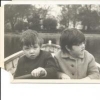-
Posts
7,149 -
Joined
-
Last visited
Content Type
Profiles
Forums
Events
Books
Everything posted by Karsa Orlong
-
I think it was fitting that it was marked by one of the greatest goals ever . . . just not scored by him
-
Book #75: Safe House by Chris Ewan Blurb: Sometimes hiding isn't your only option. Everybody say 'oooooooh!' (okay, the blurb doesn't say that ) Thoughts: Set on the Isle of Man, the story begins when its main protagonist, Rob Hale, is involved in a motorbike accident (a motorbike accident on the IoM? Go figure!). As he lies injured at the roadside a paramedic arrives and tells him that he's going to be okay but his passenger, Lena, is in more serious need of attention and will be taken in the first ambulance. Another ambulance is on the way, don't worry, says the medic. Some hours later, Rob wakes up in hospital with a nurse at his bedside. When he asks after Lena he is told that no-one else was brought to the hospital. When two police detectives turn up to take his statement they say the same, and the doctors say that Rob may be experiencing false memories brought on by the blow he has taken to the head. But, even though he only knew her for a few hours, Rob is certain that Lena exists. I can't make up my mind about this book. On one level, I really enjoyed it. It's fast-paced, there is a decent amount of suspense, some good twists and a great sense of place (Ewan lives on the IoM and it shows). On another level, it's got some silly holes in the plot, the characterisation isn't particularly good, and it is perhaps a tad too long for the amount of story that actually exists. My biggest problem with it, though, is that it starts in first person, told from Rob's point of view, but then regularly jumps to third person to tell you what's happening to other characters. I've read other books like this, and I'm not sure it works. If an author's going to be brave enough to tell a story in first person then they should, imo, be brave enough to stick to it. It's demanding, of course, because it means they can only relate events that the main character has witnessed themselves, and I felt that Ewan cheated by dropping out of first person with such regularity. It's almost like he's admitting that he couldn't tell the story that way, which begs the question: why didn't he just tell Rob's story in third person as well? Problem solved 6/10
-
They had this concert on Sky Arts last night - frelling awesome
-

What Was The Last Music You Bought?
Karsa Orlong replied to chesilbeach's topic in Music / TV / Films
After Forever - Mea Culpa The Sword - Apocryphon -
I found that as well. Just getting the books onto the damn thing was a trial in itself. Wouldn't recommend a Sony at all.
-
It's the only attraction I might have to vote this week - can't have Kimble being in the bottom two again - she hasn't found the one-armed man yet!
-
That's the one
-
Two, so far: Silverthorn by Raymond E Feist (boring!) Heroes Die by Matthew Woodring Stover (wasn't grabbing my attention)
- 78 replies
-
- gave up on
- 2012
-
(and 2 more)
Tagged with:
-
There was one particular action that one of the characters took in it that didn't sit quite right with me - I just couldn't see anyone agreeing to do it (although the affect it had on him afterwards was really well handled). Plus I hear that the second book is even better
-
Book #74: Bitter Seeds by Ian Tregillis Blurb: The year is 1939. Raybould Marsh and other members of British Intelligence have gathered to watch a damaged reel of film in a darkened room. It appears to show German troops walking through walls, bursting into flames and hurling tanks into the air from afar. If the British are to believe their eyes, a twisted Nazi scientist has been endowing German troops with unnatural, unstoppable powers. And Raybould will be forced to resort to dark methods to hold the impending invasion at bay. But dealing with the occult exacts a price. And that price must be paid in blood. Thoughts: The blurb for this book sounded so cool I couldn't wait to read it. It sounds a little like X-Men meets Lovecraft and, in some ways, it is. But it is also much, much darker. Starting in 1920, Tregillis introduces us to his main characters as children, some orphaned by the Great War. What I really liked about this book was that, despite the potential for it to lurch into comic book territory, it treats its subject matter with respect even when it's drawing on elements of science fiction, fantasy and horror, and it always, always places the characters first and foremost - which I found pleasantly surprising considering the Hollywood aspect of its USP. His main characters are both British and German, and they are all fully fleshed out individuals, none of whom overstay their welcome, and all of whom you want to know more about. He doesn't invite you to favour one side or the other - all motives are shades of grey, and each side is seemingly capable of despicable acts. So clever is he with his characterisation that my favourite character in the book was the one who had the least 'screen time', Gretel, the German orphan who can see the future. His story is somewhat episodic in nature, covering the period 1939 to 1941, and leaves much to the imagination, often jumping back into the story to tell of the aftermath of certain events. Being effectively and alternate history tale, the effect his characters have on real-life events can be quite chilling. At no time does Tregillis play it for laughs. This is very much a 'what if?' novel, rather than a crash-bang blockbuster. The action, when it comes, is frightening and brutal, and the way he shows his characters dealing with the consequences of their actions is wholly believable. However, in one particular case, that these characters would even consider such actions in the first place is a little debatable. This is Tregillis's first novel, and the first in his 'Milkweed Triptych', and it is an astonishingly good start. The second book, The Coldest War, arrives in February, with the final instalment, Necessary Evil, coming just two months later. Can't wait! 8/10
-
The Thing (2011) - nothing special, but I liked the way it tied into John Carpenter's 1982 classic
-
Remembering the fallen
-
Imagine - Ian Rankin Had to laugh when he got the automated PPI call: "F*** off! F*** off!!! I get hundreds of these calls!" I was saying "Ian, just wait till the end of the message and press '9' for gawd's sake"
-

Tim's Horror, Fantasy and Sci-Fi Reads from 2012
Karsa Orlong replied to Timstar's topic in Past Book Logs
I thought the magic system in Mistborn was great, but if you asked me to name even one of the characters now I couldn't do it. I wanted to like it, I really did. Shame, cos it's put me off reading his other books -
-
-

What Was The Last Music You Bought?
Karsa Orlong replied to chesilbeach's topic in Music / TV / Films
Don't buy anything they released after Promised Land! -

Tim's Horror, Fantasy and Sci-Fi Reads from 2012
Karsa Orlong replied to Timstar's topic in Past Book Logs
Great review Tim I think that last sentence pretty much sums up what I've thought of the Sanderson books I've read so far (which, to be fair, is only the Mistborn trilogy) - some great ideas but nothing particularly memorable. -
Small steps, then?
-
You did, didn't you! I hope you might read some more at some stage down the line
-
Sophie Gråbøl interview: http://www.guardian....bol-the-killing
-
Who are you and what have you done with the real poppyshake??
-
Book #73: Heroes Die by Matthew Woodring Stover Blurb: Renowned throughout the land of Ankhana as the Blade of Tyshalle, Caine has killed his share of monarchs and commoners, villains and heroes. He is relentless, unstoppable, simply the best there is at what he does. At home on Earth, Caine is Hari Michaelson, a superstar whose adventures in Ankhana command an audience of billions. Yet he is shackled by a rigid caste society, bound to ignore the grim fact that he kills men on a far-off world for the entertainment of his own planet--and bound to keep his rage in check. But now Michaelson has crossed the line. His estranged wife, Pallas Rill, has mysteriously disappeared in the slums of Ankhana. To save her, he must confront the greatest challenge of his life: a lethal game of cat and mouse with the most treacherous rulers of two worlds . . . Thoughts: Got 180 pages into this one and gave up. I don't like abandoning books, but I wasn't enjoying this one at all. The writing's a bit clunky, I didn't like the characters (although, to be fair, you're probably not meant to), and there seemed to be a lot of monotonous description which slowed it down to a crawl. I just wasn't feeling the love, man! Plus, I discovered that the sequel is difficult to get hold of and is ridiculously expensive even if you get it second-hand: http://www.amazon.co...52287813&sr=1-1 So I figured why bother carrying on?




